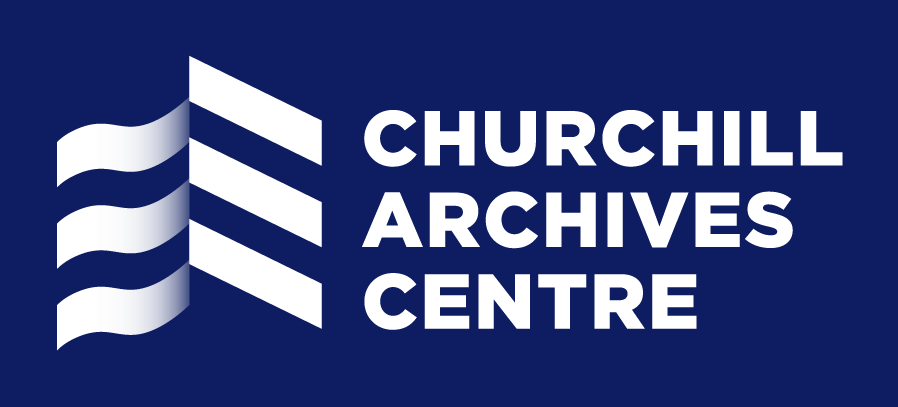Nicholas Roskill was the eldest son of Captain Stephen Roskill, a former Senior Research Fellow at Churchill College, for whom both the Roskill Library and the Roskill Memorial Lecture are named. Nicholas was intensely proud of his father’s legacy and became a keen supporter of the College and the Churchill Archives Centre, regularly giving the vote of thanks to the speaker at the Roskill Dinner. He, and his wife Julia (who survives him), were regular visitors over many years and Nicholas was well known to many members of the College community. This obituary has been written by his son Edward and sister Clare with additional information supplied by Julia.
Early Life
Nicholas was born on December 6th 1931, the son of Stephen and Elizabeth (née Van den Bergh) Roskill. His arrival could not have been more timely and welcome. In February earlier that year, Stephen’s mother, Sybil (née Dilke), had been tragically killed in a fire at her family’s London house. Nicholas was thus the eldest of what became eventually a family of seven children, the youngest born in 1947.
In order to give birth at her father’s house, Elizabeth had returned from Malta where Stephen was stationed with the Royal Navy. The house was a large Victorian mansion at 8 Kensington Palace Gardens, Kensington, London – part of the Crown Estate. (In the 1940s after the family had given up the lease, it became a multi-service interrogation centre for German prisoners of war, known as The London Cage). Nicholas’s maternal grandfather was Henry Van den Bergh, of the Dutch Jewish margarine manufacturing family. (The company became Margarine Unie and then merged with Lever Brothers to form Unilever in 1930.)
Nicholas’s next brother, Mark, was also born at their grandfather’s house, in 1933. Stephen was then stationed mainly in the Far East. In 1934 Elizabeth decided to join her husband in China and the two small boys were left for a year in the care of their grandfather and his large, devoted household. (Elizabeth’s adventures are wonderfully described in her near-weekly letters held in the Churchill College Archives Centre).
After Stephen’s return to England, the family, with its increasing number of young children, lived in various houses near naval bases such as Plymouth and Portsmouth, until Stephen and Elizabeth decided a stable family home was a necessity. They bought Blounce, in north-east Hampshire, in 1936, outside the village of South Warnborough where some of the family are now buried, including Nicholas’s parents. The house was Elizabethan at the back with a fine William and Mary 1699 façade added. It came with a large garden, farm buildings and some 12 acres, later increased to 60 acres of arable and woodland. Here Nicholas had a country childhood, learning to ride and later to shoot and with plenty of freedom. He had a much-loved pony called Junket and there were many animals on the farm: horses, a fine herd of Jersey cows, pigs and hens. A tennis court was built and became a popular facility, especially with many teenage friends visiting for tea, tennis and croquet on the front lawn.
During the war, the enterprising Elizabeth bought a bright yellow and red caravan from local gypsies. For some years she and the children had much fun travelling in it, pulled by a large horse called Ghost. When not in use, the caravan stood in a field in front of Blounce, visible from the road and became a well-known local landmark. Nicholas always had an eye for a good prank. When there were suspicions of a poacher in the woods, he enthusiastically dug a deep manhole to trap him only to be disappointed when his efforts did not result in a capture.
Education
At the age of eight, Nicholas went to a boarding prep school called Spyway on the Dorset coast beyond Worth Matravers. It was run by two brothers, Eric and Geoffrey Warner, who became friends of the family. It was famous for its sea water swimming pool, Dancing Ledge, quarried out of the limestone cliffs. From there, Nicholas progressed to Summerfield House at Marlborough College (1945 – 1950), where he was Head of House and learned to compose poetry, and then to Corpus Christi, Oxford (1952 – 1955) where he read Classics and Greats. He did National Service 1950 – 1952 in the Royal Navy Voluntary Reserve as a Sub-Lieutenant, stationed in the Mediterranean under Lord Mountbatten. He purposely chose to wear the distinctive wavy navy tie, at a celebration of the Friends of Mount Athos held at Highgrove a few years ago, as Prince Charles (now King Charles III) was its Patron. Sure enough Prince Charles’s eagle eye spotted the tie and immediately asked about Nicholas’ service, to which he was able to give the happy reply that he had served under Lord Louis Mountbatten C-in-C Mediterranean, Prince Charles’s great uncle.
Career
Nicholas joined J. Henry Schroder Wagg & Co Limited in 1955 in its merchant banking division. He was promoted to Assistant Director in 1969 after spending a year in its New York office, before leaving being ‘poached’ by Morgan Grenfell & Co in 1974. He remained at Morgan Grenfell until 1991, leading a section of the Corporate Finance Division, with a particular emphasis on investment trusts and property companies. He was early in the ‘cycle to work’ movement from the late 1970s and was still riding his bicycle around the streets of Camberwell into his 80s.
He built long term business relationships which often developed into life time family friendships. He was closely involved advising and then becoming a non-executive director of the Norwich family property company, Property Partnerships, which listed on the London Stock Exchange in 1962. As Paul King, son of the founder of Property Partnerships remarked ‘Nicholas was a person of great calibre and utter integrity, with a keen sense of fun. He was an exemplary director with a most inquisitive mind’.
He spent time working and advising, in Singapore in the late 1970s, the hotel and property company Hong Leong Group, becoming lifelong friends of the founding Qwek family.
On retirement from full time employment he became a non-executive director of certain investment trusts listed on the London Stock Exchange (The Throgmorton Dual Trust PLC and The New Throgmorton Trust (1983) PLC). He was a General Commissioner of Taxes and a lay member of the Investigation Committee of the Institute of Chartered Accountants. He was also Treasurer of the League of the Helping Hand, a charity founded in 1908, which helps those experiencing hardship and who have physical and diagnosed mental health conditions, learning disabilities and those caring for such people.
Personal
Nicholas was an usher at the wedding of Neil Kelly in the Henry VII chapel of Westminster Abbey, when he met Julia née Cooke), one of the bridesmaids to childhood friend and fellow Girtonian, Rosemary Barry. Julia was a Girton history graduate who later helped Stephen Roskill in his research.
They married in 1965; Edward was born in 1968 and Sybil in 1971. They made their home in South London, in a Georgian house, where he became a leading member of an early movement to restore Georgian houses in South London.
He was among the first members of the Camberwell Society in 1970 which was an amenity society set up by law for those living, working or interested in Camberwell, in South East London. It was involved in promoting high standards of planning and architecture, securing the preservation, protection, development and improvement of features of historic or public interest in Camberwell.
Nicholas worked tirelessly on local issues – such as making sure that property developers could not build over the tennis courts of a local club; enabling the recovery of derelict property into viable businesses; and he personally went about removing local graffiti – using his ‘secret and rather dangerous and expensive chemicals’ but embarrassing the Council into contributing in a meaningful way.
He became President of the Camberwell Society in 2017 – an honorific title for his many years’ service – and in exchange for which he delighted in providing champagne and his home-made marmalade for the Christmas raffle. As the current Chair of the Camberwell Society said ‘Although Nicholas was a very formal man, he conducted himself with a humility that was very special. He created an impact as much through his character as his achievements’.
He was awarded a Lifetime Achievement Award by Southwark Council for his contribution in removing graffiti and supporting the local community.
Nicholas was always active. He played cricket and real tennis and was a founding member of the Tennis Club in Camberwell. He enjoyed shooting.
He was a very keen hiker, walking In the Tatra Mountains in Poland, Pindus mountains in Greece, climbing both Mount Athos and Mount Ararat in Turkey amongst many others. He was a member of the Travellers Club which perfectly reflected his love for travel and adventure.
He very much enjoyed spending time at the family mill house in the Aveyron in France, bought at the time of his retirement in 1990. He rarely sat down in the sun. He was always busy painting the shutters, chopping up trees or rebuilding the stone walls.
On a different scale from his time in the Royal Navy, he also enjoyed sailing – both on his shared yacht, Clairella, and latterly on chartered boats across Europe.
He was a keen amateur poet, never missing an opportunity to write a poem to mark a special occasion – birthdays, weddings, anniversaries or any celebrations. He was an exceptional marmalade and chutney maker, proudly winning awards at the International Marmalade Competition (although marked down for having messy labels!). Julia, his wife, remembers that when the kitchen was commandeered for marmalade or jam making, it was out of action for days on end.
Amongst his greatest interests was the Roskill Lecture at Churchill College, Cambridge and maintaining the family link with the Archives Centre there following his father’s death in 1982.
He leaves Julia, his wife of nearly 60 years, who was very much mater familias, devoted to Nicholas and who had an invaluable role supporting Nicholas throughout his life. Nicholas’ achievements in his lifetime were very much built on Julia’s support, without whom he would have achieved – and been – much less.
Nicholas Roskill’s memorial service will be held on Thursday (10 April) at Southwark Cathedral.


